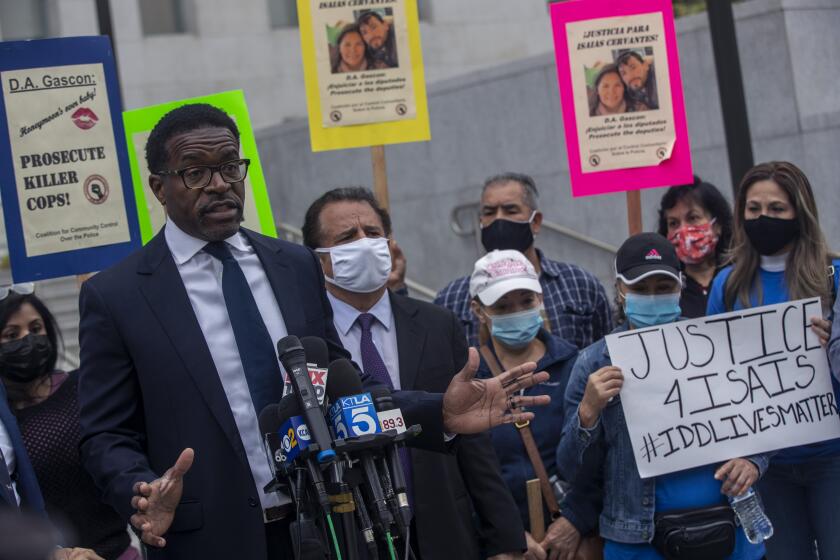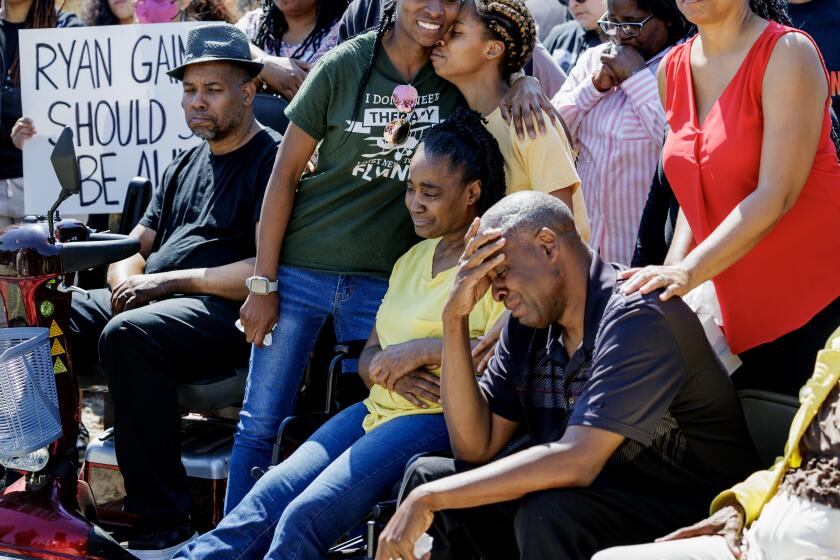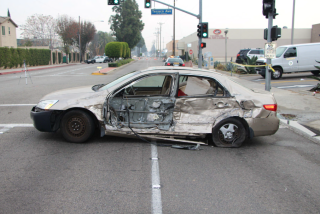County approves $25-million settlement for deaf, autistic man shot by deputies in his living room
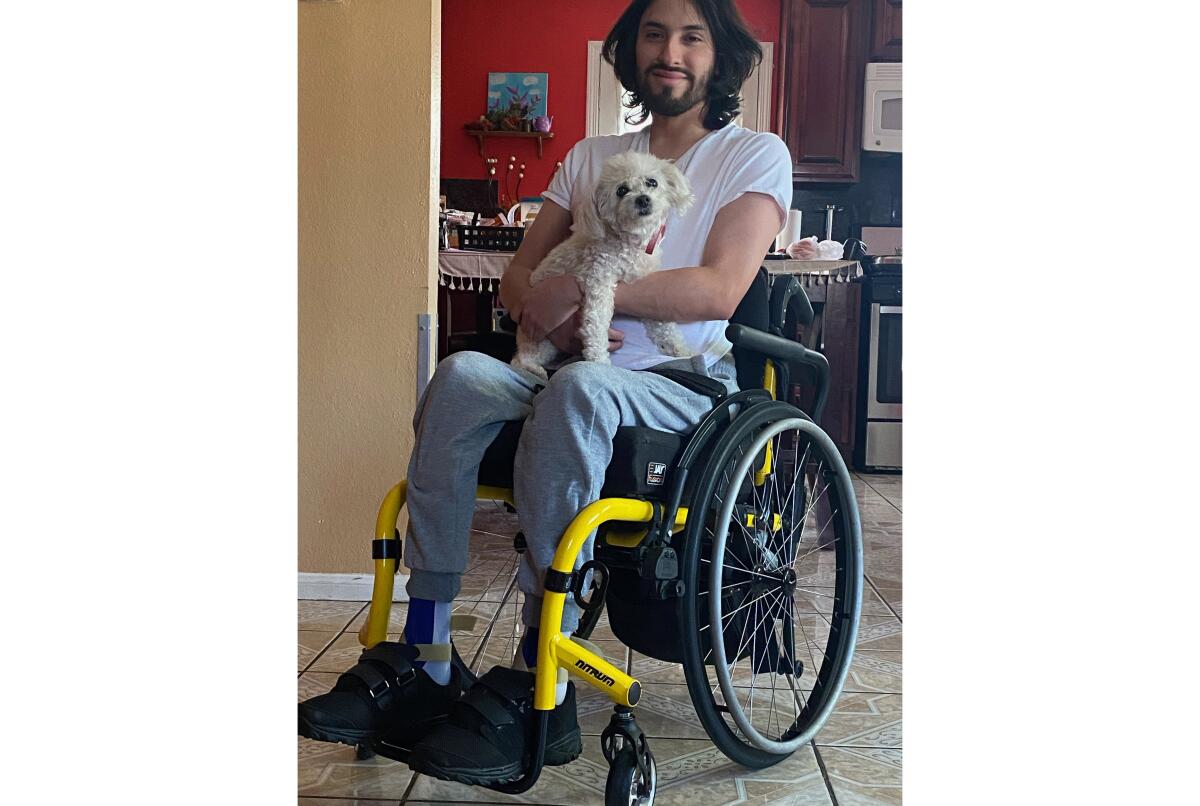
Three years after a sheriff’s deputy shot an unarmed deaf and autistic man in the living room of his family’s Cudahy home, the Los Angeles County Board of Supervisors agreed to pay the family a $25-million settlement.
Isaias Cervantes was left permanently paralyzed as a result of the March 2021 shooting, which took place a few feet away from his mother, sister, therapist and twin brother, who has cerebral palsy.
On Tuesday, the family’s attorney, Austin Dove, told The Times that the settlement in the family’s lawsuit against the county could help them all move forward.
“They’re at a point where they’re feeling some semblance of hope now,” Dove said. “They’re feeling a form of relief.”
The multimillion-dollar settlement is an unusually large sum, even for the lawsuit-prone Los Angeles County Sheriff’s Department, which last year — between settlements, judgements and legal fees — cost taxpayers $150 million to defend.
Despite the hefty payout in the Cervantes case, the Sheriff’s Department determined that the deputies involved — David Vega and Jonathan Miramontes — did not violate any policies with their use of force. A corrective action plan did not find that any broader changes were needed to prevent future problems.
The amount L.A. County spent on all claims — nearly $1 billion — exceeded the combined current budgets of the district attorney, public defender and animal control departments.
In a statement late Tuesday, the department reiterated that its internal review found no policy violations.
“Any call for service that results in a shooting is traumatic for all involved and an additional layer of complexity is added when we encounter an individual who is experiencing a mental health crisis,” the statement said, before going on to highlight the importance of the department’s specialized Mental Evaluation Teams — which were not called to the scene before the shooting in 2021.
“We continue to brief personnel on the importance of utilizing the department’s Mental Evaluation Team resources and responses when they are available,” the department concluded.
The lawyer representing Vega did not offer any comment on Tuesday, but Tom Yu — who is representing Miramontes — expressed his dismay.
“This use of force was solely caused by Mr. Cervantes, not the deputies involved,” he said. “I’m utterly disappointed at the county for giving up on defending the deputies for doing their jobs.”
A settlement is said to be near in the California Department of Justice’s sweeping investigation of the L.A. County Sheriff’s Department.
Around 9 p.m. on March 31, 2021, Cervantes’ sister called 911 to report that her brother — who she warned was mentally disabled and hard of hearing — was being aggressive with their mother.
“He’s here in the house,” she said, according to a recording released by the Sheriff’s Department. “Can you guys send him to a hospital?”
When East Los Angeles Sheriff’s Station deputies Vega and Miramontes arrived on scene, Rosa Padilla — Cervantes’ mother — met them outside the home, according to video of the incident later released by the department.
She told the deputies that police had been to their home before and that her son hadn’t been aggressive with them. She said he suffered mental health issues and was on medication. This time, she said, he was upset that she wouldn’t buy him a snack.
When deputies Vega and Miramontes approached the front door, video showed one of them calling out to the 25-year-old, who was sitting on the living room couch. They asked him to come to the door, but he refused.
“You’re not under arrest but you’re not giving me no option [but] to put, to place handcuffs on you,” one deputy told Cervantes from the doorway, without explaining exactly why he had to cuff him.
The deputies then walked inside, saying they were there to help. They asked Cervantes to stand up, and each grabbed one of his arms. But when one deputy started to handcuff him, video showed that Cervantes jerked his arm away and a struggle ensued. Both deputies’ body cameras fell off but kept recording.
According to the Sheriff’s Department, Cervantes then “attacked one of the deputies gouging at his eyes while attempting to disarm him.”
One deputy shouted, “He’s going for my gun!”
The other asked: “Does he have your gun?”
The recording doesn’t show anyone answering that question. Still, seconds later, one of the deputies — later identified as Vega in county records — fired a shot into Cervantes’ side.
Afterward, the deputies continued trying to subdue Cervantes until one announced: “I got his hand off, I got his hand away from my belt.”
In the background, Cervantes groaned.
Deputies’ shooting of Isaias Cervantes in his own home will probably cost Los Angeles County $25 million without spurring a change in training or tactics to prevent something similar from happening again.
On Tuesday, Dove told The Times the claim his client grabbed a gun was “a complete fabrication” and that it would have been virtually impossible for the much smaller Cervantes to snatch the weapon from the deputy’s secure holster. During deposition testimony for the lawsuit, Dove added, Vega admitted that he did not see Cervantes with the gun when he opened fire.
After the shooting, Cervantes spent a month in the hospital, where he underwent multiple surgeries. But the bullet permanently damaged his spine, leaving him in a wheelchair and “physically paralyzed for the rest of his life,” according to the lawsuit filed almost three years ago in Los Angeles County Superior Court, asking for unspecified general and punitive damages.
The shooting prompted calls — including from the Cudahy City Council — for an independent investigation and renewed protests over how police respond to mental health calls. In the corrective action plan attached to this week’s settlement motion, the county admitted that neither deputy tried to call the department’s Mental Evaluation Team, which is designed to help de-escalate interactions with mentally ill people and avoid uses of force.
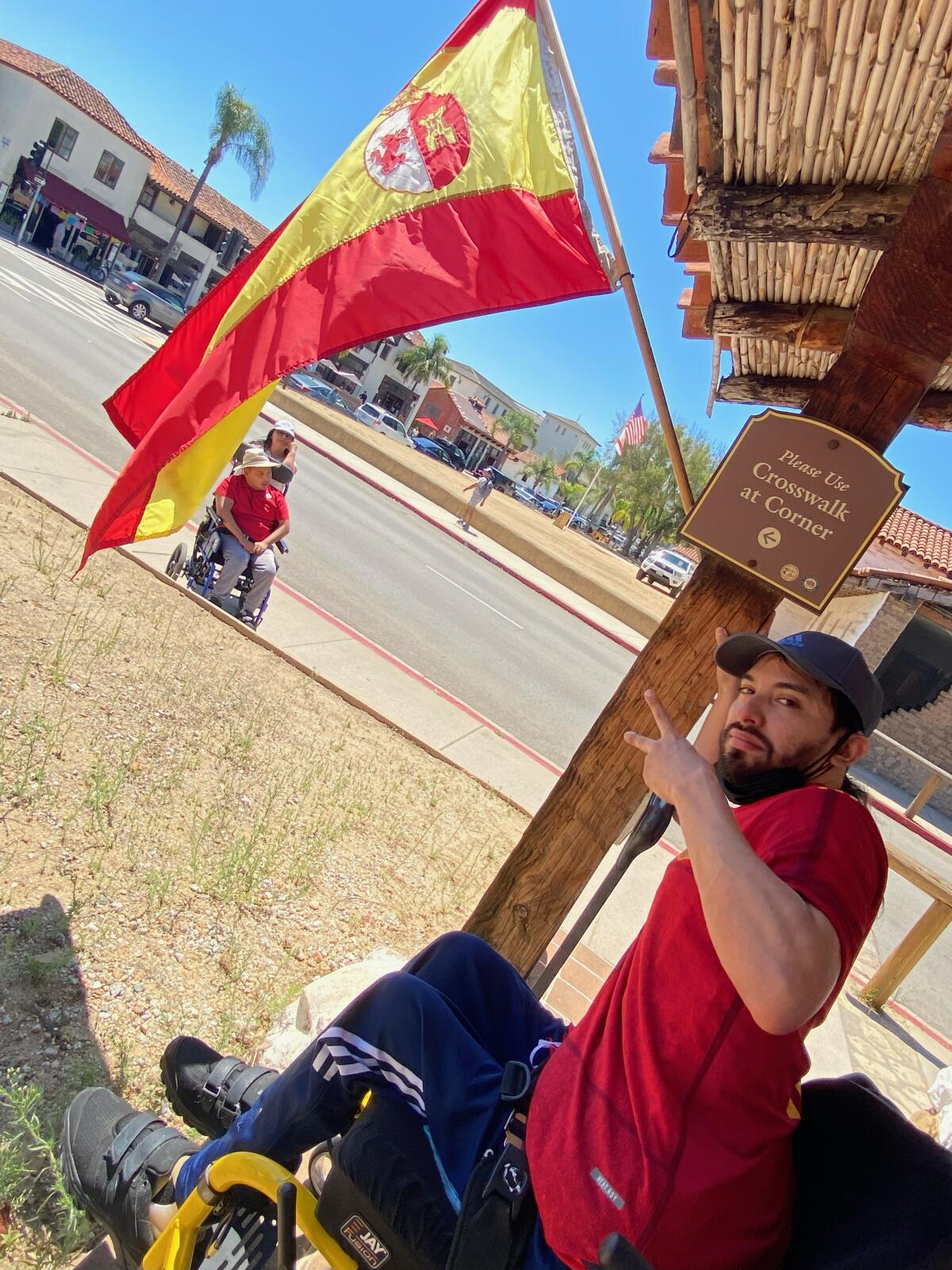
“It’s just not right,” Cervantes’ sister, Yajaira Cervantes, said in 2021. “I wish that they would be more trained officers that know how to deal with disabilities.” Unlike in several other high-profile shootings of mentally ill people by deputies in recent years, Cervantes survived, was later charged with assault and resisting arrest. Court records show the criminal case against him was dismissed in early 2022.
Ultimately, prosecutors declined to charge the deputies involved in the shooting, records show.
Even so, one of them — Miramontes — is now grappling with legal issues in a different case that seemed poised to fade away but has since been revived by a California appeals court.
In August 2021, prosecutors accused Miramontes and Deputy Woodrow Kim of lying to cover up an on-duty assault. They each were charged with one felony count of filing a false report about a September 2018 incident in which Kim allegedly knocked a suspect to the ground with the door of his patrol car.
He and Miramontes had been chasing a fleeing suspect through Ruben Salazar Park in East L.A., and Kim wrote in his report that he opened the car door in preparation to hop out and give chase on foot as they closed in on the suspect. At that point, Kim wrote, the man stopped running and Kim tried to stop the patrol car to prevent a collision. The man then “walked closer to our patrol vehicle and collided” with his door, after which he was “still standing.”
Family of 15-year-old with autism fatally shot by deputies files claim against San Bernardino County
The family of Ryan Gainer, a 15-year-old shot and killed by San Bernardino County sheriff deputies, filed a wrongful death claim against the county.
In his report, Miramontes didn’t mention the collision and instead wrote that the suspect tried to “give up by suddenly stopping and turning toward us.”
According to prosecutors, video showed that the patrol car crashed into the suspect and launched him “a number of feet in the air.”
But at a preliminary hearing in 2022, Judge Ronald Coen tossed out the case, finding that there wasn’t enough evidence.
At the time, the deputies’ lawyers both lauded that decision. Josh Ritter, who represented Kim, said “it could easily be argued that what is shown on that video is consistent with what they described.” Meanwhile, Yu said he thought the incident was treated as a crime only because the department did not complete its internal administrative investigation within the one-year statute of limitations.
But this year, after the district attorney’s office appealed Coen’s decision, an appeals court overturned it and reinstated the case.
“We are pleased by the Court of Appeals decision to reverse the dismissal of felony charges against Deputies Kim and Miramontes,” the district attorney’s office said in a statement this week. “The Court of Appeals unanimously found that the evidence was in fact sufficient to proceed to trial against both deputies. We will continue to hold law enforcement personnel accountable for their actions and look forward to a jury trial.”
This week, Yu said he respected the court’s decision and was “ready to fight” again on behalf of his client.
The hefty settlement and the recently reinstated case come as the Sheriff’s Department is facing the possibility of increased scrutiny ahead. A three-year civil rights investigation by the California Department of Justice is headed toward a sprawling settlement agreement.
The agreement is expected to touch on issues including jail conditions and deputy gangs, and sources familiar with the matter told The Times that an early report from the state includes recommendations to curtail traffic stops, stop enforcing some drug laws and increase staffing levels. The department is already subject to five settlement agreements overseen by federal courts.
More to Read
Sign up for Essential California
The most important California stories and recommendations in your inbox every morning.
You may occasionally receive promotional content from the Los Angeles Times.


